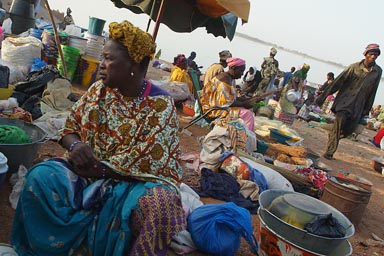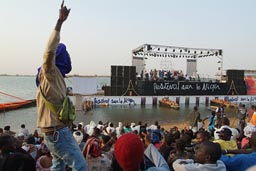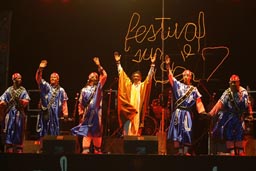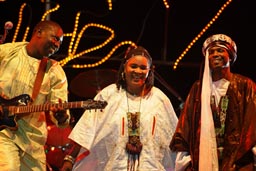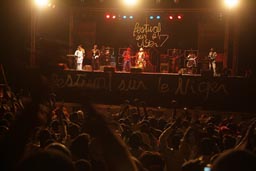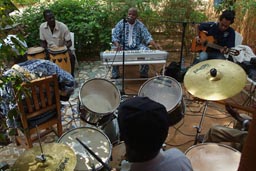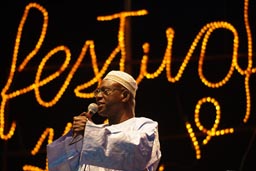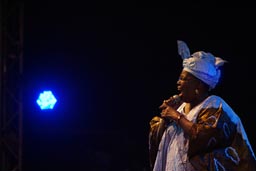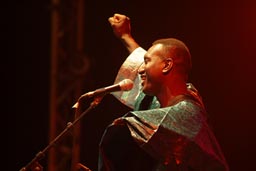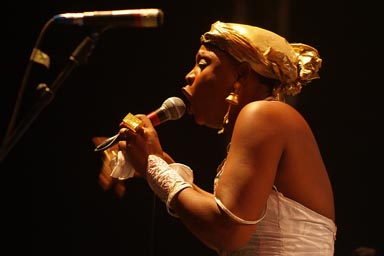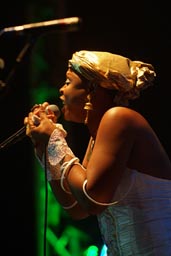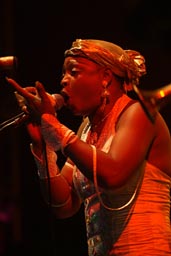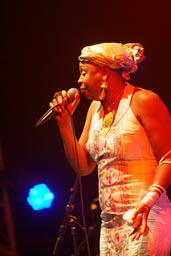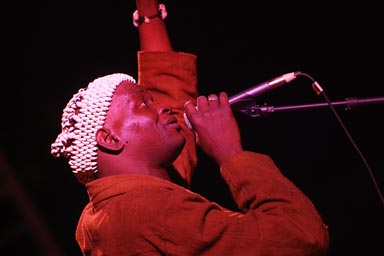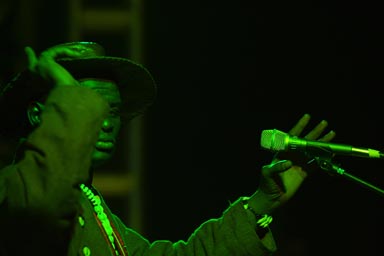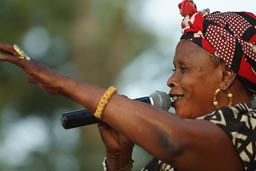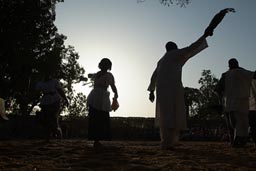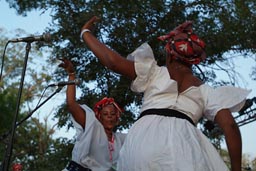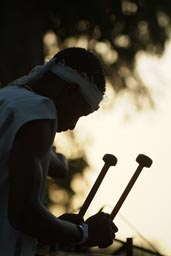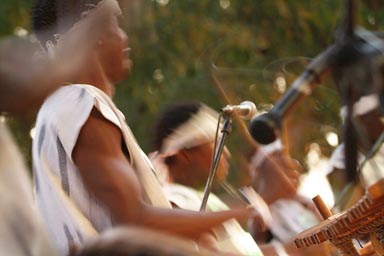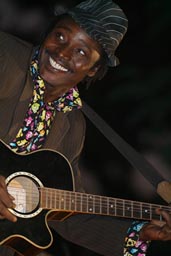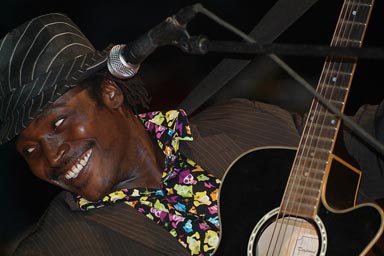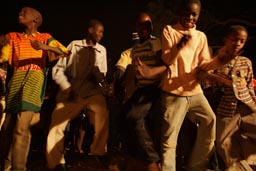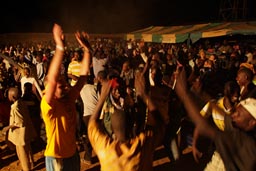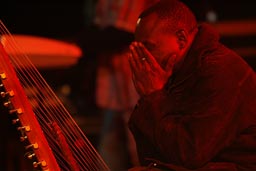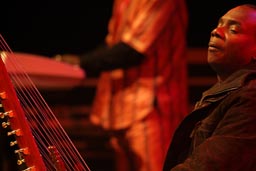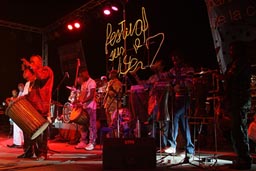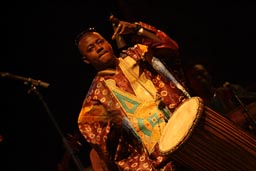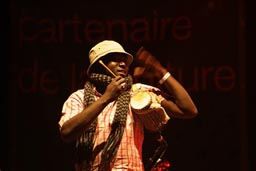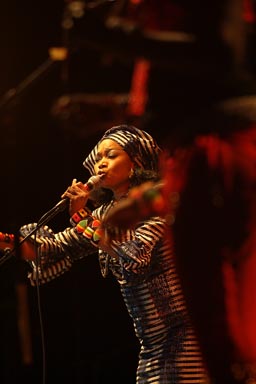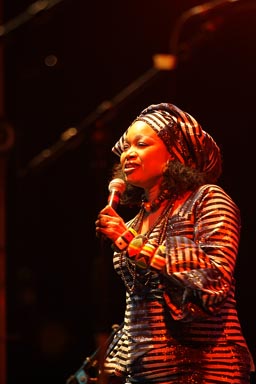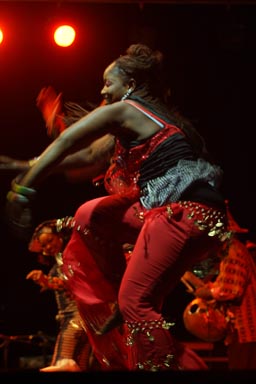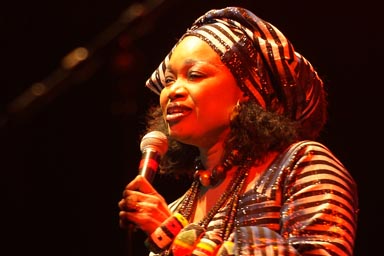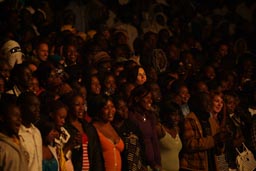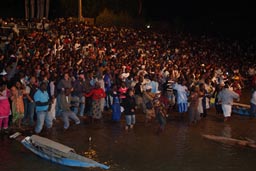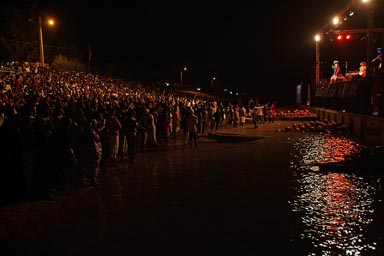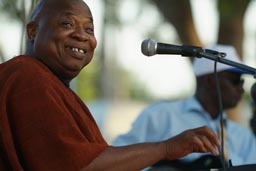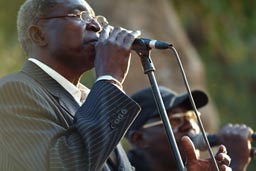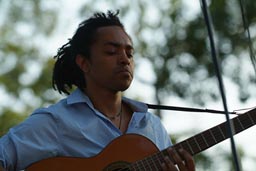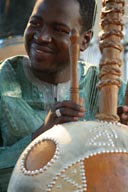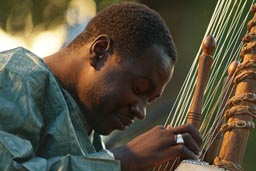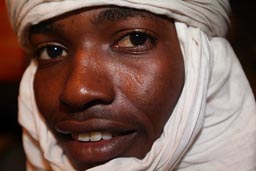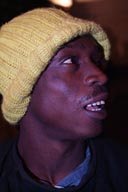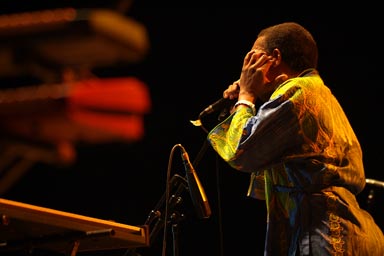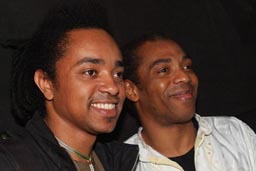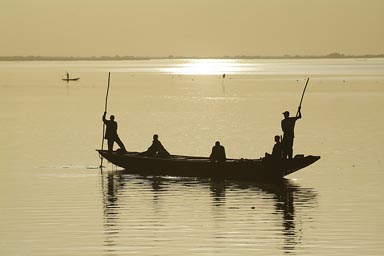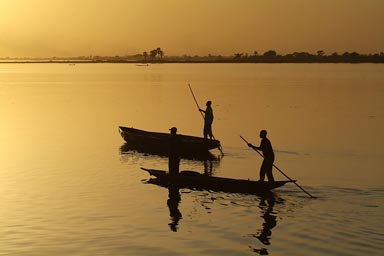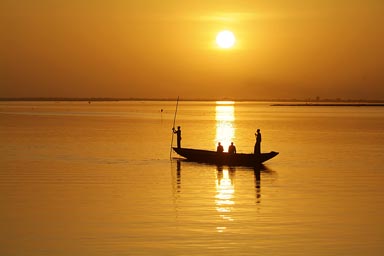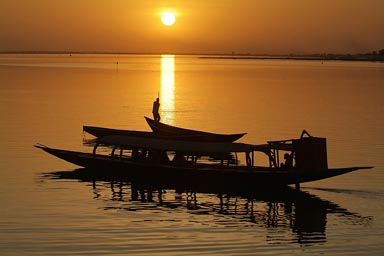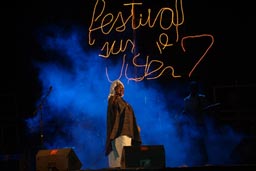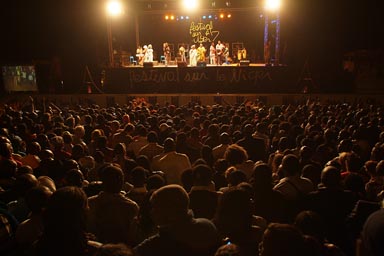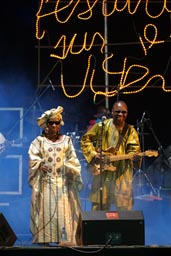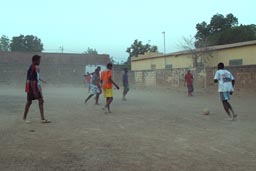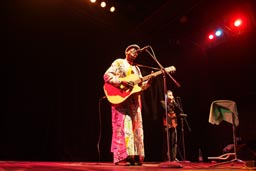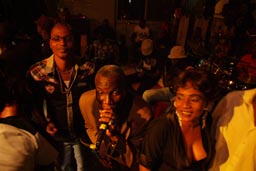www.thisfabtrek.com > journey > africa > mali > 20110206-segou
My Feb2011 Segou Festival diary.
My 3rd Festival sur le Niger, after 2006 and 2008, I know what comes, many days and nights and little sleep ahead, expectations are high, the artist line-up is impressive: Toumani Diabate, Oumou Sangare, Femi Kuti, Ismael Lo, Sayon Camara and many more.
2nd of February - Segou, Mali.

The Niger River lies quiet in a thick harmattan haze, winds bring dust and sand, a pirogue rows by behind the stage on the river, a fisherman throws out his net. A bit confusing the run-up to the opening ceremony this afternoon, there are issues with the sound. While the Donsow (traditional hunters) in the back still fire their rifles, Neba Solo, grand Malian balafonist and group on stage try get us in the mood, just we can’t hear the balafon, techies work frantically to find the short, then we hear how he smacks the mic continuously. The speeches start and I am not impressed by the talk of how good they are; my badge was not processed and the voices of those that talk go under in a lot of noise feedback, the technique after 7 years is still so much troubleshooting.
But eventually after all the talk, Neba Solo gets a second showing, then Super Biton of Segou and the crowd goes crazy, already - late afternoon. There is a lot of expectations in the air, they simply have to get the sound sorted.
Music of Africa’s and Mali’s North is on the program. Amongst it Morocco’ Gnawas open, later Thialey Harby, nephew of Godess Khaira Arby, the evening closes with Vieux Farka jamming to some old tunes of his legendary father. As said they need to get the sound sorted and process my badge.
The morning after, after a long night and a lot of griot or djeli jamming in an open air disco till 4, I am still waiting for my badge. Outside of Savanne Hotel cafeteria Cheick Tidiane Seck, Malian synthesizer virtuosi and since years a mentor/supporter of the Niger Festival is setting up a little rehearsing session, he's recorded and played from New York to Paris with greats Hank Jones, Carlos Santana and Joe Zawinul, in 2000 he was invited by the University of California - Los Angeles to teach "African music meets Jazz", I have seen him in 2008 here, seen him from close distance at other occasions jamming with Toumani Diabate in Bamako, I am glad to see this friedly big man again. Him and members of Super Biton and Cape Verdean guitarist/singer/songwriter Bilan, a 12 piece orchestra start jamming this morning, that puts me immediately in a super great mood; I sure now all will be fine.
3rd of February - Segou, Mali, Bassekou Kouyate, Sayon Camara.
Friend Julie comes back, tells me the director has signed it, my badge request, she already saw the other guy producing it, an hour later indeed I have a badge, I am happy; what a difference a day makes. Winds have arrived, nights on the Niger became chilly, we all freeze, crew, audience, Africans and tourists, musicians and stars, on est ensemble, we are together here on this second night in Segou.
The red and yellow lights of the festival reflect rainbow like ribbons on the Niger's surface, as the wind blows the amazing voice of Kasse Mady Diabate, from one bank to another. Performing on his own he stepped out of the shadow after many years of singing for Toumani Diabate. 2nd act Bako Dagnon is a griot and guardian of the old Mande traditions. Then comes on an old star on the Segou festival, much younger Bassekou Kouyate (BBC 2008 world music award), he enthrals with an outstanding performance. Master of ngroni and also griot is accompanied by three more ngronis and his lovely wife Amy Sacko. I have seen Bassekou some 6 times, also in Essaouira, he has not changed in 3 years, a new album is out and successful, his sound is still signature Bassekou, N'goni blues.
It is the Guinean diva that captivates, she is the star of the night. I still have this great affiliation and fascination for Sayon Camara, power woman that I toured with for a brief moment in 2007. She and husband guitarist Sissoko come to Segou with a complete new enlarged band, a new album. Sissoko has taken the group in a new direction; the still dominant so well known Guinean griot voice of Sayon is supported by a 12 piece orchestra with a distinct Salsa influence, 4 horns, more percussion pep than ever and Sissoko’s usual sweet and mellow guitar. In Guinea and Mali for some 40 years these different streams in music have mixed effortlessly since international solidarity brought together African and Cuban musicians for crosspollination. I am loving it!
Friday, 4th of February - Segou, Mali, Adama Yolomba, Toumani Diabate, Oumou Sangare.
in colaboration with Christina
Segou third day, afternoon, we float up-stream the Niger to a side stage, the Mangala Camara stage. Mangala, giant Malian poet with the beautiful voice died end of last year, is missed. I met him on a few occasions, saw him on stage several times (Conacry 2007, Segou 2008, Essaouira 2008); also once enjoyed a few beers with him in Bamako. One of my pictures is featured in the back of the stage.
On the stage in Mangala’s honour the opening act is all traditional, Bobo music, music from the area, balafon, tamtam and the griot voice of a beautifully, elegant woman called Mama Djoulo. "She is not a griot, but an artist, a djeli/jeli," tells us Abdoulaye a helper backstage who Christina starts talking to. Griotism, as we know is passed down through family lineage, Abdoulaye simplifies it for us "griots sing for money, as opposed to artists/djeli who sing for the love of the art". Before only griots were allowed to sing, now in the 21st c. singing as an art and accepted, and the resistance, by fear of death that artists faced, has long become a thing of the past. Abdoulaye begins to explain what the songs mean. The first one he says is about fishing. We begin to see how the dancers emulate the movements of fishermen, things start to have more clarity and Abdoulaye keeps explaining. Mama Djoulo sings of a barren woman called Issa who wanted a child. She tries for 10 years, but nothing changes, then she goes to see a marabout (spiritual/Islamic head of a community), now she has a child. So simple, the men strum on a long drum called the Bongolo, they use sticks and hands to drum or rather talk, they play their drums with a kind of solemn concentration, very different from a conga or djembe player. However and eventually each song ends in pretty wild ecstasy by dancers and drummers.
Babenya, talented percussion group from Burkina Faso is next. They are promising young talent, almost percussion only, 3 balafons, a kora, djembes and more, so great their energy! Give them another few years and they might be West Africa’s next sensation. They sing of the joy of being invited to the festival, and of cause and effect.
Next is Adama Yalomba, my silhouette/sunset picture from 2006 features this year’s festival poster, I am so high to see this happy smiling man again, his still plays a painted kamel n’goni, red, green and yellow, also an acoustic guitar, he heads a straight rock (guitar/bass/drums) formation. His rebellious lyrics advise people to open their eyes or else they will encounter problems, then about "guruma", which means stinginess, and how it destroys relationships and communities. Finally he sings about the beauty of Mali, the crowd moves into the arena and especially the children go over the top on the sand.
The night sets in and we move back down to central Segou and the banks of the Niger River, to the main stage to see world-famous Toumani Diabate and his Symmetric Orchestra. His calm demeanour camouflages his actual control over family, community or just the current show, he seems similar to an orchestra conductor; he brings out the best of his musicians. The music is simply fantastic, the drumming/percussion excellent/simply the best bang around, the stage visibly shakes, Toumani’s kora sounds stick out, sharp and harmonizing.
There is something divine and elevating about his music. We are sad to see him go; Ismael Lo has a hard act to follow. His music is mellow/popy, a little too soft for this evening, too soft for Mali certainly. He plays his famous song "Africa" and the crowd responds. We take the "pause" and relax at the already very late hour, fetch a drink in a marquis in the back of the tribunes. Finally the Madame of Mali comes on, Oumou Sangare enters and the excitement sees no end. She is accompanied by two graceful dancers, who keep it lively, Cheick Tidiane Seck, the guerrier lends his synthesizer support as he did before to Toumani Diabate. The crowds freak out completely, dances/screams, it is one big party; the front rows are knee deep inside the Niger River. It is 2 o’clock when all winds down and we cannot leave, fall exhausted into quick sleep inside our van, while a huge traffic outside dissolves.
-C. end.
Saturday, Cheick Tidian Seck, Femi Kuti.
So there we go Saturday after spending all morning uploading photos and posting our impressions of a great festival, there we go back to the Mangala Camara stage to experience maybe the most interesting fusion act here: The professor’s, Cheick Tidiane Seck’s little project, a band put on top of the torso of Super Biton of Segou, with some excellent musicians tossed in the pot, Bilan’s sweet latino vocals and guitar and Madou Sidiki Diabate’s holy kora. And what comes out is pleasing to all of us; from local traditional music loving teens to old residents of the city of Segou to the audiophile guests from afar - those who come and look for the new, the fusion between African, Latino and jazz. Yes the conductor from Segou, the guerrier (warrior) as he is called, has pulled it again, for years a mentor to the festival, he himself adds the most beautiful voice and wildest synthesizer acrobatics, and holds the band together. Madou Diabate really adds the magic, makes the angels sing through his kora cords, when I get around the back of the stage to express my excitement to Christina I see tears in her eyes, Madou has just opened the heavens so God could descend on this dusty piece of land, the Mangala Camara stage in Segou. Who said it to me? "I think sometimes he [Madou] is better than his [much more famous] brother [Toumani]". Song after song take us in different musical directions and truly amazing is how the old guard of Super Biton manage to pull us back to the roots, remind us where we are embedded at, the special lieu, the origins of a great orchestra with its distinct Cuban/Afro influences; these olds are the guardians of this heritage.
Yes maybe in hind-side this was my highlight of the Festival sur le Niger in Segou. After Fati Kouyate, beloved griote we head back to town after dark. With some time left we decide to descended on friends Caty’s and Chab Toure’s bar Carpe Diem, other friends come and go. "Little Tuareg" Mohamed, oh I met him first 5 years ago when we gave him and friends Ahmed and Salek a lift through the desert from Timbuctu to Essakane, poor Mohamed got so sick driving the dunes then, now he has grown to be a man. There is also Moumou, from Segou, friendly and always everywhere, his distinct feature is that he walks on all four, drives a motor cycle with 3 wheels in the back, think is polio but we never talk about it, overlook that he has such difficulties, he blends in with everybody else, seems to handle his physical condition lightly, his muscular bodyworks allow him to climb the highest bar stool at ease. Just when we think of leaving for the main stage Pieter van der Houwen glances in by the door. Well that means we are done for the night, only by midnight we make it to Femi Kuti, rather just see him come down from stage. This is what most of my festival experiences are like, I always manage to miss a day somewhere, somehow…?
Only get one proper shot of Femi, backstage, here with Cape Verdian Bilan.
Sunday, The festival and the sunset on the holy river Niger.
Sunday the internet is broken, afternoon comes, as always there is only one thing left to do, see a great golden sun set over the flat of the Niger River while the pirogues cross. While the closing speeches wrap-up and Cheick Tidiane Seck and fusion band dish out their Segou songs, their songs have become so entrenched in my brain by now, we sit on the pier, take in the sun and watch the quiet serenity. The silhouettes of the bodies and the boats protrude from the aluminum, then silver, later more orange and golden surface of the water, a spectacle in the name of the River, the holy River, the source of life in this part of the world - and it has been so many years and year after year I sit on the same spot, Sunday at the end of one of the best African music festivals.
The festival this evening closes with a very traditional but enormously bluesy set (n’goni and n’goni-ba, djembe, kalabsh) of griote Sadio Kouyate, I adore the rhythm of the bass (ba) n’goni, it makes me dance and it also heats up the crowd for the final of Amadou and Mirijam. Oh we deemed the famous blind couple from Bamako as old, as yesterday’s and we were so wrong, they roll and rock more than ever - and believe it or not it’s the wild constant djembe bang that carries the music, it’s the djembe that talks and makes us scream. And then - this festival is over. I shudder when I put down the words.
9th of Feb: Sick in Bamako.
The festival is over; the road back to Bamako was long, hot and dusty; when the pressure falls off -, now I lie flat and exhausted, so sick with a severe cold, sip bissap (roselle, a Hibiscus variety) infusion and honey, this supposedly gives energy. I fear my upcoming malaria might aggravate things and start medicating this typical pain in the joints which creeps up the spine, the lacklustre, the general fatigue; must be malaria.
A week later all is fine. Must have been malaria then...
Yes we are talking tropicana (plasmodium falsiparium) here, it is the one that kills, the other one, that stays with you for a life, nests in the liver, we don't care about here... Maybe it doesn't exist here...
Mid February - Friday night in Bamako, the djelis, the griots, the marabouts.
When the dust glows in faint diffused light and the footballers kick the leather in the dirt, when eventually the heat dies down a bit, when the traffic from the other side of the Niger River pushes patiently one-way over the Martyrs’ (old) Bridge out of town, when the view is greatly inhibited and every other passer-by, motorcycle and bus-taxis drivers and passengers alike wear face masks, when the Sahara dust called harmattan blends into a toxic cocktail with diesel and moped fume and make the air in Bamako really unfit for breathing, this is when we head out, the throat and sweat of the day demand beer in large bottles, we head the other way, hit town and our mood is fantastique, expectations for tonight are high.
Boubacar Traore (myspace, wiki), known as Kar Kar is on in the French Cultural Centre, the old man who sings the blues in a holy way, reflecting a tragic life, from revolution success to poverty stricken odd jobs in France to final and just fame, - and peace at heart. Boubacar tought himself a guitar picking style that doesn’t employ but two fingers, a Sahel Blues that bewitches the listener with ultimate mellowness. Kar Kar is accompanied by Vincent Bucher (myspace), world-wide celebrated harmonica player from France. A calabash is the only drum instrument. Reduced to the minimum of voice, acc. guitar, harmonica and calabash the audience is take on a dream journey, a voyage back in time, the life of Boubacar Traore and the nostalgia and traditions of West-African Blues.
Dazzled we walk out after 2 hours, the evening is still hot and dusty, we certainly now need beers, again. Toumani Diabate (myspace) and his Symmetric Orchestra are on in Maquis Le Diplomat. Every Friday the place is packed and we can listen from so close, look over Toumani’s shoulders while he strums out his famous kora sounds, or dance at touching distance to his percussionists, give a high five to the djembe player or Liman who hits his dundun drum and rings the bell, Liman, like stung by a tarantula. Toumani Diabate the double Grammy-award winning World music superstar who on tour performs in front of 10,000 people in New York and elsewhere, here this is a different show. Toumani is a griot, from a traditional griot family, those who in the Mandinge cast system had the privilege to sing, where history and story were relayed from generation to generation by song, where news and story were orally transmitted by griots. Toumani, only in his 40s, assumes responsibility for the large family, the traditions and spiritual tasks of his trade. The outsider even when spent many years in West-Africa will only understand so much, the secrets are being kept, amongst the griots, marabouts (imam, spiritual leader) and traditional healers. When Toumani Diabate enters, the aura that surrounds him can be felt, he walks in slowly on a stick, shows respect to Muslim elders in the back, greets all those higher in the hierarchy. Hierarchy is important in Africa, Africa is built on hierarchy, a 5 year old already has his younger brother to delegate and even the oldest and most powerful griot has a marabout and a president to consult with.
We dance, close our eyes, listen to n’goni, guitar and kora, and feel the percussion bang of the various drums. An old man, well in his 60s, in an all white Western suit moves onto the dance floor, waves a stick, the heads of snakes carved in the wood. All I know is the elder doesn’t carry his rod for walking but as a sign of who he is or whom he represents, the family, the name of the spirits and totem animals. This is a place to see and be seen, whole families come here on a Friday night, - and the griots, female and male sing the praise while the young dance; just what makes it such a very special occasion today? The old man in white, would want me to believe that. The music carries on till 3 in the morning. Toumani leaves, shakes a few tourists’ hands, "Thank you for coming here." We have another drink, join some friends then to leave for Exodus, a late hangout owned by an Algerian. A taxi waits just outside, the old man in white with the stick just took his seat in the front, the only passenger. Politely I ask the elder, and he happily shares his taxi with us. We start talking to the old man and once at the bar invite him to join us for a beer and he explains, - just enough so we get an idea: He is Mohamed Soumano, griot, a healer, a fetisheur, he can tell the future. His older brother is the chief of the griots in Bamako, the president consults with him. Mohamed has lived 30 years in Paris, is back for a month or 2 every year, in search of his roots, he is called by spirit, he would like his children to know Africa better. You can see the snake, his animal as he explains, in his eyes. He is "fully protected", one goes protected when one goes to an event like today's, there are different fractions and rivalries in the casts, protected with kri-kri (leather pouches that contain spiritual stuff, letters with words from the Koran on it, animal parts) around his arms, and his waist. This makes him untouchable, he claims and he ponders that we met for a special purpose, not yet clear to either of us.
The mosquitoes bite near the bushes outdoors in Exodus, while we talk and move closer to 5 in the morning. Our new friend is tired too, what we all want is follow the spirits to dream land. Such a special night this night has been in Bamako, we think while our taxi jolts over the dusty uneven dirt roads in our Bamako banlieue, the muezzin calls already; a few hours of sleep till sun hits hard, the children start playing and the mopeds go by the van in which we sleep.
www.thisfabtrek.com > journey > africa > mali > 20110206-segou

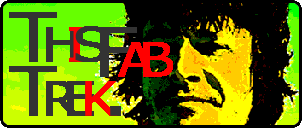

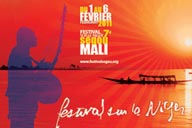
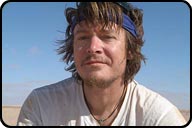
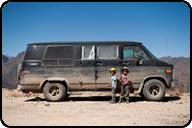
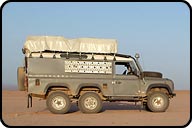


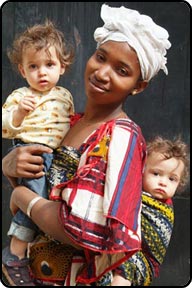
 contains Festival/Fiesta/Art photography.
contains Festival/Fiesta/Art photography.
